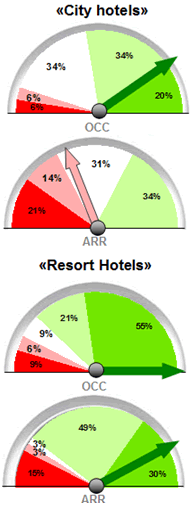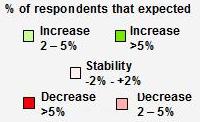Greek Hospitality Industry Performance - 2nd Quarter 2013
Introduction
This newsletter provides a snapshot of the performance and outlook of the Greek hotel industry, within the broader context of the international hospitality industry as well as of Greek tourism and Greek socio-economic developments.
% Change in International arrivals1 in Greek airports, 2013 compared to 2012
Region |
% Change Q2 |
% Change YTD Q2 |
| Athens |
2.6% |
-1.3% |
| Thessaloniki |
4.7% |
2.1% |
| Rest of Greece |
16.8% |
16.8% |
Source: SETE, processed by GBR Consulting
% Change in RevPAR2 in Greek hotels, 2013 compared to 2012
Region |
% Change Q2 |
% Change YTD Q2 |
| Athens |
14.6% |
5.8% |
| Thessaloniki |
-18.0% |
-18.3% |
| Resort |
15.2% |
18.7% |
Source: GBR Consulting
RevPAR in Competitive Destinations, 2013 compared to 2012
Region |
% Change Q2 |
% Change YTD Q2 |
| S. Europe |
3.9% |
4.0% |
| Rome |
3.5% |
2.5% |
| Madrid |
-4.4% |
-5.9% |
| Cairo |
0.4% |
2.5% |
Source: STR Global, processed by GBR Consulting
Commentary
- Almost 4 million tourists arrived at the Greek airports in the second quarter of 2013, which is 442,000 more (+12.6%) than the same quarter last year. Athens and Thessaloniki also recovered from a bad start of the year, especially in the months May and June, while April was still negative.
- As a result occupancy levels are overall higher at Greek hotels, with the exception of hotels in Thessaloniki which benefited in 2012 from Libyans recovering from the Libyan Civil War. In terms of room rates, resort hotels improved their performance, while hoteliers of Athens and especially Thessaloniki saw their rates declining.
- Hotels in southern Europe in general rebounced in May and June after a difficult March and April, leading to an improved performance in comparison with same period in 2012. Same trend is also applicable for Rome, while Madrid started a recovery in June. Circumstances in Cairo and in Egypt in general remain difficult, following the ousting of former president Morsi by the army.
Greek Tourism sector on very positive track this year
- The above positive indicators are confirmed by positive official figures for the first months of 2013. Greece's current account balance showed a small surplus in May of € 35.5 million, from a deficit of € 1.2 billion in the same month last year. This result was achieved mainly by a narrower trade gap and higher tourism receipts. In May, tourism receipts reached € 1,054 million, an increase of 38.5% compared to May 2012. This brings the total tourism receipts in the first five months of the year to € 1,733 million, representing an increase of 15.5% compared to the same period last year.
- In the same period of January – May 3,048,000 travellers visited Greece, 263,900 more than in the same period last year. This means that the average expenditure per trip also increased from € 539 to € 569, which is also encouraging. It is expected that by the end of 2013 at least 17 million tourists will have arrived, spending around € 11.1 billion, up from € 10.0 billion in 2012.
- Finally, according to the GBR Consulting barometer for 2013 Q3, there are differences between resort and city hotels. Indeed all hoteliers forecast higher occupancy levels for this year. But, while resort hotels are also upbeat about ARR, city hoteliers expect it to decrease.
Expectations for 2013


2,500 new 5* rooms in crisis year and 61% of 5* hotel rooms are branded
- Despite the difficult economic circumstances between 2009 and 2012, Greek and foreign entrepreneurs kept on investing in the Greek hotel market. We identified at least eighteen 5* properties representing more than 2,500 rooms that were built in this period. Among these two international brands: Iberostar opened the Odysseus, an all inclusive resort in Kos with 267 rooms and Aman Resorts opened Aman Zoe, a 38 suite deluxe resort in the Peloponnese.
- In Athens the five star King George hotel opened again under the umbrella of Starwood Hotels & Resort Worldwide. According to our preliminary research data on hotel branding in Greece, Starwood is the third international hotel group in Greece with 2,301 rooms under their control. The largest international group is TUI with 6,108 rooms, of which 4,986 rooms as part of its joint venture in Grecotel. The second largest international group is Thomas Cook with 2,899 hotel rooms, of which Sentido is the largest brand with 1,727 rooms.
It is also interesting to note that the data also shows that there are currently 20 international groups active in the Greek hospitality sector with 32 hotel brands. Furthermore, 51% of the five star hotels and 61% of the five star hotel rooms are branded through an international, national or local brand, or through a marketing consortium. With respect to the four star properties, 17% of the hotels and 30% of the hotel rooms carry a brand.
Privatisations
- In July the Hellenic Republic Asset Development Fund (HRADF) launched the tender process for the Xenia hotels on the islands of Andros and Skiathos and in Tsagarada, prefecture of Magnesia, in the area called Pillion. The hotels range in size from 44 – 84 beds currently and were built at the late fifties, early sixties. The properties are listed buildings. October 11, 2013 is the final date for the submission of proposals.
- In the short term, HRADF intends to launch a tender for the development of a seaside plot of 16ha, situated in the south-eastern part of Argolida in the Peloponnese, close to the town of Ermioni, adjacent to the resorts of Porto Hydra and Hydra Beach. HRADF proposes the development of an upscale mix use resort complex. This tender follows on the tracks of the two tenders for Agios Ioannis (26ha) and Paliouri (21 ha) beachfront properties in Chalkidiki, a prime tourist destination.
- In the long term HRADF intends to sell its 49% stake in the Hellenic Casino of Parnitha (HCP) – Athens, the second largest casino in Greece. The remaining 51% belongs to Athens Resort Casino SA, an investment vehicle owned by Regency Entertainment (70%) and construction company Ellaktor SA (30%). Regency has a management contract with HCP, which is valid until 2013.
Changes in the legal environment
- A draft law currently discussed in Parliament foresees Condo Hotels, where rooms can be sold, timeshared or leased long term. This will only be possible for 4* and 5* hotels within urban zones.
- In the same draft law as well as in the new tourism spatial plan, provisions are made for a friendlier environment for the development of multiple use resorts. Also a Law was recently passed providing for renewable 5 year (Schengen) visas to foreigners and their families buying or timesharing property valued at a minimum of € 250,000; this provision targets affluent Russian, Chinese and Arab prospects.
Endnotes
1 The international arrivals statistics are based on SETE calculations compiling the data from 13 major airports of Greece, representing 95% of foreigners' arrivals by plane in Greece and 72% of total foreigners' arrivals. Thessaloniki airport does not distinguish between arrivals of Greeks and foreigners.
2 RevPAR : Revenue per Available Room; for Greek resorts, calculations are based on TRevPAR (i.e. Total RevPAR).
Download this issue as:
- PDF (379 kb)
Πίσω

